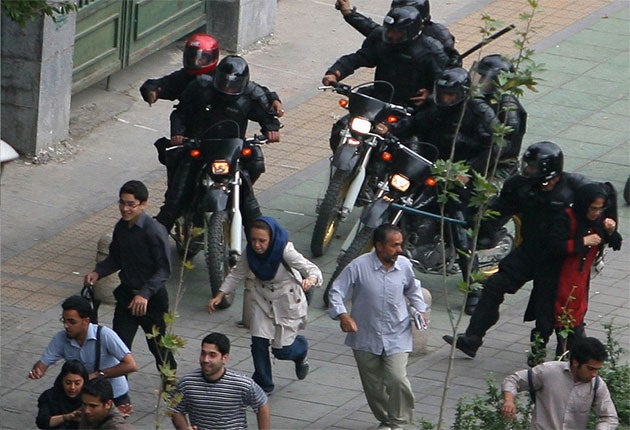Your support helps us to tell the story
From reproductive rights to climate change to Big Tech, The Independent is on the ground when the story is developing. Whether it's investigating the financials of Elon Musk's pro-Trump PAC or producing our latest documentary, 'The A Word', which shines a light on the American women fighting for reproductive rights, we know how important it is to parse out the facts from the messaging.
At such a critical moment in US history, we need reporters on the ground. Your donation allows us to keep sending journalists to speak to both sides of the story.
The Independent is trusted by Americans across the entire political spectrum. And unlike many other quality news outlets, we choose not to lock Americans out of our reporting and analysis with paywalls. We believe quality journalism should be available to everyone, paid for by those who can afford it.
Your support makes all the difference.A doctor who exposed the torture of jailed protesters in Iran died of poisoning from an overdose of a blood pressure drug in a salad, prosecutors have said. The findings fuelled opposition fears he was killed because of what he knew.
Investigators are still trying to determine whether Ramin Pourandarjani's death was a suicide or murder, said Tehran's public prosecutor Abbas Dowlatabadi, according to the state news agency IRNA. The 26-year-old doctor died on 10 November in mysterious circumstances – with authorities initially saying he was in a car accident, had a heart attack or committed suicide.
Dr Pourandarjani worked at Kahrizak, a prison on Tehran's outskirts where hundreds of opposition protesters were taken after being arrested in the crackdown following June's disputed presidential elections. The facility became so notorious that it was ordered shut down by Iran's Supreme Leader as reports of abuse and torture became an embarrassment to the clerical rulers and security forces.
Dr Pourandarjani later testified to a parliamentary committee and reportedly told them that one young protester he treated had died after heavy torture.
The young physician died from an overdose of propranolol in a salad ordered from a restaurant, said Mr Dowlatabadi. Propranolol is used to treat high blood pressure, rapid heart rate and tremors, and can be lethal in high doses.
Investigators questioned the restaurant delivery man but he was not under arrest, said Mr Dowlatabadi. The delivery man said he gave the salad directly to Dr Pourandarjani, describing how the doctor took it from him at the door of his room, then closed the door.
Forensic tests showed the doctor died of "poisoning by drugs" matching the propranolol found in the salad, said Mr Dowlatabadi. "A large number of these pills must be used for a person to pass away from them," he added.
Last week, Iran's top police commander, Ismail Ahmadi Moghaddam, insisted the death was a suicide, saying the doctor faced charges over failure to fulfil his duties to treat the detainees and killed himself in despair in a lounge at the courthouse. The police chief said a note was found with the body. Mr Moghaddam's comments were the first public word that Dr Pourandarjani faced any charges – or of where he died.
One pro-reform MP dismissed the claims and suggested a link to the torture at the prison. "It is impossible to accuse him of suicide," said Masood Pezeshkian, the opposition website Roozonline reported. "The idea of suicide by someone who had no problems and no serious disease – and was present during the events at Kahrizak – seems questionable to us."
The doctor's father, Reza-Qoli Pourandarjani, told the Associated Press last month that he didn't believe any of the causes given so far by the government for his son's death. "Just the night before his death, my child talked to me on the phone, it was around 8pm or 9pm," he said. "He sounded great, very dignified, displaying no sign of someone about to commit suicide."
The next day, Mr Pourandarjani received a call from the commander of Tehran's security forces informing him that his son was in a car accident with a broken leg and needed his consent to have surgery. When he travelled to Tehran, "we found out that that wasn't the case", the father said.
Several opposition websites raised concerns that Dr Pourandarjani was killed because he knew the conditions of a number of torture victims at Kahrizak, including 24-year-old Mohsen Rouhalamini, the son of a prominent conservative figure. Hundreds of protesters were arrested following the disputed election on 12 June. The opposition says at least 69 people were killed while the government has confirmed about 30 deaths.

Join our commenting forum
Join thought-provoking conversations, follow other Independent readers and see their replies
Comments